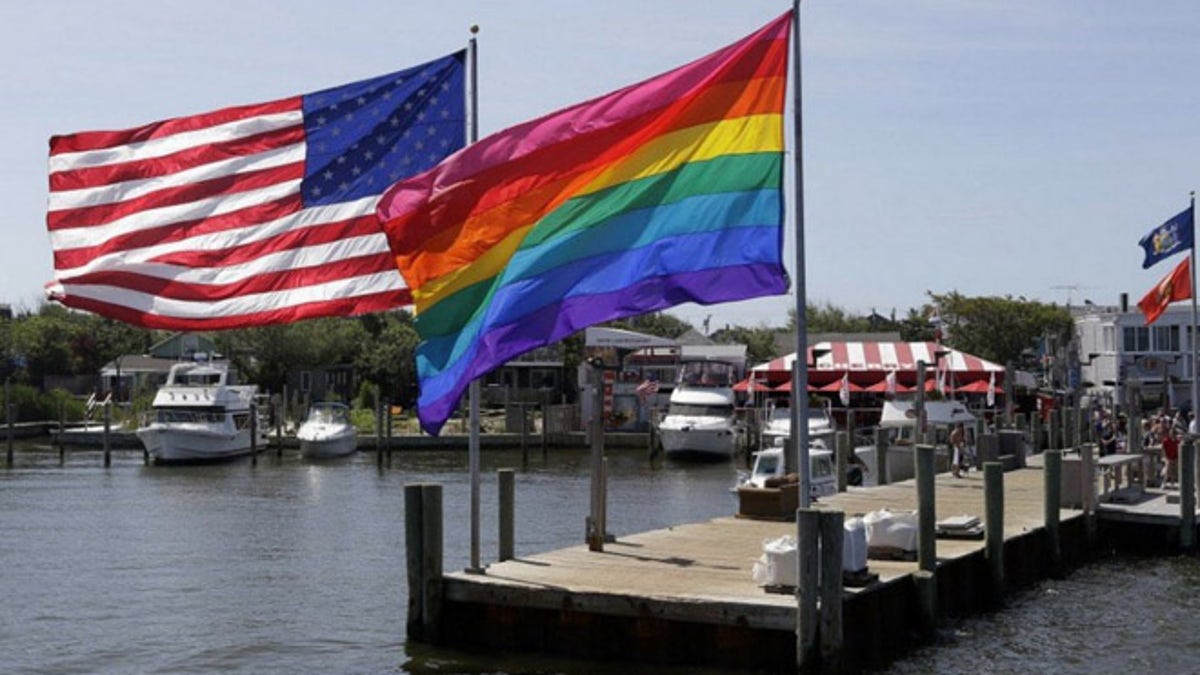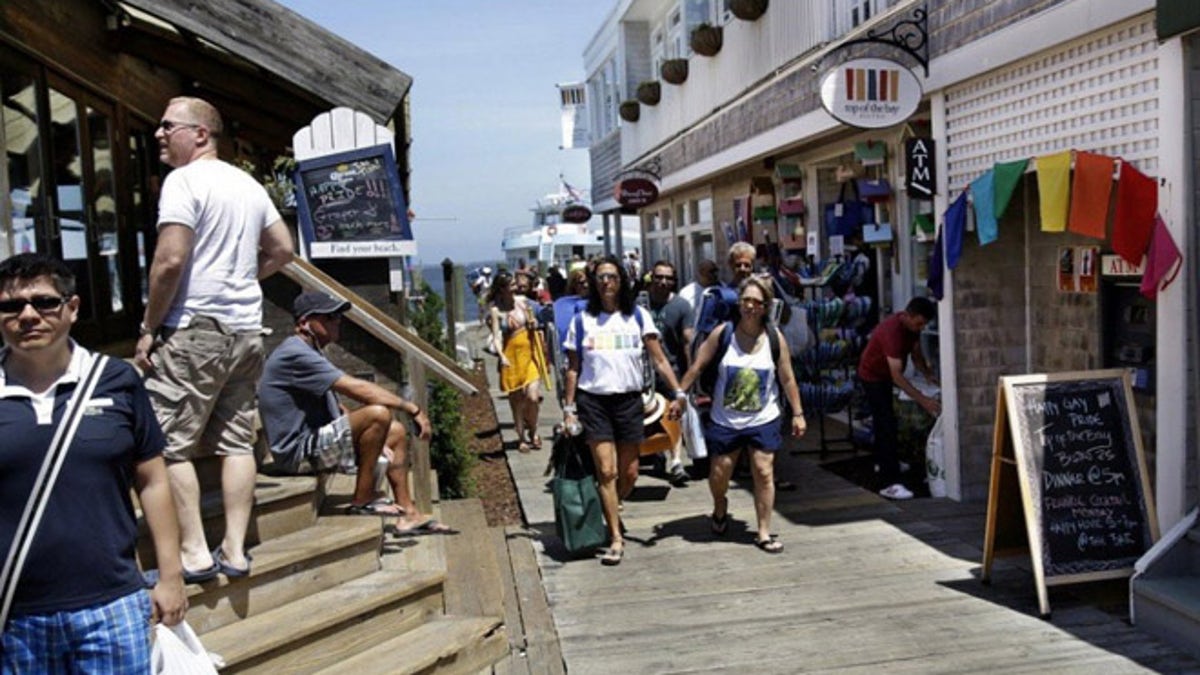
An American flag and a gay pride banner wave together on Fire Island, a barrier island off New York that is a popular summer destination for LGBT revelers. (AP)
Officials in East Coast beach towns popular with the LGBT community told FoxNews.com they are ramping up security at bars and boardwalks ahead of peak summer season, knowing the clientele is shaken and wary following Sunday’s massacre in Orlando.
The attack that left 49 dead at a gay nightclub in Florida appears to have been both a terror attack and a hate crime, as radical Muslim Omar Mateen is believed to have picked his targets for their sexual orientation.
That has authorities working to increase security at gay nightclubs located in the Pines and Cherry Grove communities of Fire Island, N.Y., and Cape Cod’s Provincetown. Authorities are also evaluating emergency medical protocols to prepare for potential instances of violence.

People get off the ferry in Cherry Grove, a beachfront community in New York popular with the LGBT crowd. (Associated Press)
“The community is very concerned that someone else could target a concentration of gay people,” said Jay Pagano, president of the Fire Island Pines Property Owners Association, who helps oversee village safety. “We feel vulnerable. We would be a target.”
Although few reside year-round in the Pines or Cherry Grove communities, both on the barrier island off the southern coast of Long Island, tenants typically flock to the area after Memorial Day, adding an element of urgency for revision of emergency plans.
The Pines, for instance, sees an influx of around 5,000 people during peak times like the Fourth of July, according to Pagano.
After the Orlando attack, Pagano requested increased police presence throughout the Pines and in nightclubs. He said he is confident the local marine police and members of the local police commissioner’s office will respond.
Nightclub owners are also taking initiatives, seeking immediate measures to enhance safety and communicating with Pagano as well as local police. Simple steps, such as banning large bags that could hide weapons, are among the obvious changes that can be implemented right away and without cost.
Administrators at Pavilion, a popular gay nightclub in the Pines, have scheduled meetings with local law enforcement and other authorities to implement safety plans, said Kenneth Sullivan, director of the Commercial District of the Pines.
“We stand with the community,” Sullivan said. “The safety and security of our guests are a high priority of ours.”
Although the Pavilion momentarily paused service Sunday evening in tribute to the Orlando victims, Sullivan said the nightclub will remain open as a place to celebrate those lost in the tragedy.
“Right now, what we’re focusing on is engaging our community, welcoming everyone… embracing the love that we’re feeling right now,” he said.
Year-round citizens of Provincetown have also expressed safety concerns in light of the Orlando tragedy, and their fears extend beyond densely populated nightclubs, said Lawrence Yahn, assistant manager at the gay club Atlantic House.
“It could happen anywhere here in the streets,” he said. “It's not just limited to the bars. The whole town is like a soft target.”
Atlantic House, one of the oldest gay clubs in the world, typically fills its 396-person building to capacity on weekends. Although he is hopeful attendance remains consistent, Yahn said he is uncertain about turnout despite the frequent presence of the Provincetown Police Department and the security officers guarding every door.
“Unfortunately, because some people have [Orlando] on the back of their mind, they may decide to stay home,” he said.
In reaction to the Orlando incident, American Red Cross personnel will meet on the Cape next week to discuss protocols for the region that encompasses Provincetown.
Unlike in Orlando, where OneBlood is the primary blood supplier to victims of mass tragedies, the American Red Cross is the main provider in the Provincetown area, according to Jeff Hall, spokesman for the American Red Cross of Massachusetts.
“We’re preparing,” said Hall. “People are forward-looking right now to be ready to respond.”
Although there is only one road available for drivers to travel to Provincetown, emergency protocols are already in place because of frequent hurricane evacuation, according to Hall.
On the other hand, Fire Island relies on ferries or private boats to transport most visitors. All roads on Fire Island are unpaved and vehicles are banned, posing transportation challenges for medical responders if a large-scale emergency were to occur.
“The only way an emergency vehicle could come into play would be by boat,” Pagano said.
Even if a boat were to transport an emergency vehicle, there isn’t a hospital on the island. The Pines and Cherry Grove are approximately 30 miles from the nearest equipped hospital, separated by a stretch of sand that Pagano describes as “even less than a road.”
Pagano said delayed accessibility to hospitals is a “real problem” for Fire Island residents, and said he made his concerns clear to the owner of the Sayville ferry service.
For now, Pagano said he believes increased police presence, spot checks and luggage inspection for ferry boarders are possible steps toward improving safety.
Fire Island Police Sgt. George Hesse declined to comment on steps his department has taken in light of the Orlando attack.

